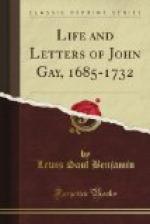Gay attended the Free Grammar School at Barnstaple, and among his schoolfellows there with whom he cemented an enduring friendship, were William Fortescue, to whom reference has been made above, and Aaron Hill.[6] William Raynor was the headmaster when Gay first went to the Grammar School, but soon he removed to Tiverton, and was succeeded by the Rev. Robert Luck. Luck subsequently claimed that Gay’s dramatic instincts were developed by taking part in the amateur theatricals promoted by him, and when in April, 1736, he published a volume of verse, he wrote, in his dedication to the Duke of Queensberry.[7] Gay’s patron and friend:—
“O Queensberry! could happy Gay
This offering to thee bring,
‘’Tis he, my Lord’ (he’d
smiling say),
‘Who taught your Gay
to sing.’”
These lines suggest that an intimacy between Gay and Luck existed long after their relations as pupil and master had ceased, but it is doubtful if this was the case. It is certainly improbable that the lad saw much of the pedagogue when he returned to Barnstaple for a while as the guest of the Rev. John Hanmer, since Luck was a bitter opponent of the Dissenters and in open antagonism to John Hanmer.
How long Gay remained at the Grammar School is not known. There are, indeed, no records upon which to base a narrative of his early years. It is, however, generally accepted that, on leaving school, he was apprenticed to a silk-mercer in London. This was not so unaccountable a proceeding then as appears to-day, for we know from Gibbon’s “Memoirs” that “our most respectable families have not disdained the counting-house, or even the shop;... and in England, as well as in the Italian commonwealths, heralds have been compelled to declare that gentility is not degraded by the exercise of trade”: for example, the historian’s great grandfather, son of a country gentleman, became a linen-draper in Leadenhall Street.
Gay had no taste for trade, and did not long remain in this employment. According to one authority, “he grew so fond of reading and study that he frequently neglected to exert himself in putting oft silks and velvets to the ladies";[8] while his nephew, the Rev. Joseph Bailer, says: “Young Gay, not being able to bear the confinement of a shop, soon felt a remarkable depression of spirits, and consequent decline of health; he was, therefore, obliged to quit that situation, and retire to Barnstaple, in the hope of receiving benefit from his native air."[9] No doubt the mercer was willing enough to cancel the indentures of an apprentice so unsatisfactory as Gay probably was. Anyhow, Gay returned to Barnstaple, and stayed awhile with his maternal uncle, the Rev. John Hanmer.




